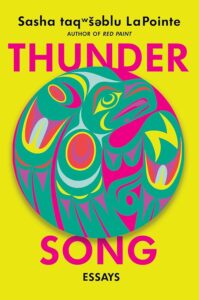Buy this from Bookshop.org to support local bookstores and the Lesbrary!
This was one of my five star predictions for the year, and I’m happy to say it lived up to that expectation.
Thunder Song is a collection of essays about being a queer Indigenous women in the U.S. today. It begins with LaPointe talking about her 83-year-old great-grandmother calling the Seattle symphony to commission a symphony. They politely turned her down, and she called back every week to ask how her symphony was going until they finally agreed. The making of this orchestral work also became a documentary, The Healing Heart of Lushootseed.
From this first essay, I was hooked. LaPointe weaved together the past and present, drawing on the stories of her family and community as well as the political movements of the moment, like Black Lives Matter. She discusses both traditional stories and pop culture. As the title suggests, music plays a big role in the collection, including her days as one of the only Indigenous people in the punk scene of Seattle: “Eventually this idea that I was a punk first and a Native person second became unbearable.”
I took so many notes while reading this that I don’t know where to start, because I want to tell you about all the essays. LaPointe talks about growing up being treated differently by white people than her siblings were, because she has lighter skin, despite the fact that they all grew up together. She talks about her struggles as a teenager, running away at thirteen, ending up in the psych ward, and then being emancipated at fifteen, living with six friends in an apartment together.
She also addresses the many ways colonization impacts Indigenous people today, from generational trauma to the crisis of missing and murdered Indigenous women and girls: “[when] one of us goes missing, we don’t get the front page or the five o’clock news. We get red dresses… I want my niece to know she’s worth more than a dress waving in the breeze. I never want her to question that the whole world would stop if she ever went missing.”
One image that really stuck with me was LaPointe describing the tulip festival that takes place on her culture’s land, and how it is a “petal-made flag of settler colonial triumph, a reminder that we have lost something.” Once marsh, this land was changed by settlers to be more “productive,” making it unrecognizable for the people who have lived off of it for thousands of years. Once a year, tourists make the roads impassible, celebrating this display of non-native flowers.
Of course, this is the Lesbrary, so Thunder Song also touches on the author’s queer identity. LaPointe says, “The first time I ever heard the term Two Spirit I felt a sense of relief wash over me.” She discusses how Two Spirit people were often sacred in many Indigenous cultures, and how the “shame [she] learned to carry is the work of generations of colonization.” She also mentions being in a throuple at some point:
“My partner wanted to know, Are you polyamorous? Meaning, Do you require multiple partners at once? The answer is no. But I do need the freedom to embrace my queer heart, to accept and celebrate it and let it run wild through the relationship.”
There is so much more that I want to talk about, like LaPointe’s journey to decolonizing her diet, or her complicated relationship with her mother, or the story about The Little Mermaid jacket, or her feelings about questioning motherhood, or the experience of going through Covid-19 as a culture where disease was part of an attempted genocide against them.
These essays are compelling and thought-provoking. All I can say is you should read them yourself! While they touch on heavy, difficult topics, this is fundamentally a story about healing and survivance: “There is something to learn from indigenous ways of thinking that has to do with courage and resilience, because even in the face of attempted genocide, of erasure, we descendants are still here.”
This is LaPointe’s second book, and I’ll definitely be reading her memoir Red Paint: The Ancestral Autobiography of a Coast Salish Punk next.
“All over the world, indigenous communities are fighting for their survival, the survival of their sacred lands, their languages, and stories. Communities are fighting for their land back, for the salmon to return, for a stop to the desecration of sacred sites. They are protecting tribal lands in South Africa. They are protecting Mauna Kea. They are water protectors and knowledge keepers, storytellers and healers. They are the song the world needs right now.”
Content warnings for missing and murdered Indigenous women, miscarriage, racism, rape, addiction, generational trauma, and abusive relationships.

